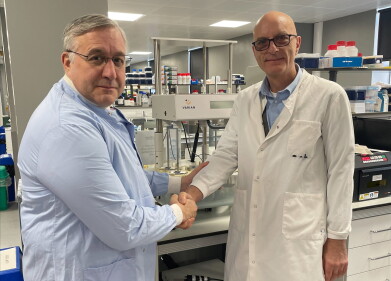News
MSI Devices to Provide Wider Earth Monitoring Network
Aug 10 2018
The University of Strathclyde is leading research on developing imaging technology capable of more targeted observation of environmental conditions on Earth.
Researchers from the Department of Physics, working with partners led by product design company Wideblue, are aiming to produce a multispectral imaging (MSI) device with a compact payload for installation on nanosatellites. Unlike commercial MSI satellites that can be up to 5.7mx2.5mx2.5mm and 2.8 tonnes, the new device would be a fraction of the size at 10cmx10cmx30cm, able to fit on a more affordable 4kg satellite of 1 size with operational orbit of around 500km above Earth.
study has received £719,000 as one of seven successful projects to secure funding from the UK Space Agency’s (UKSA) Centre for Earth Observation Instrumentation (CEOI).
Dr Daniel Oi, a Physics Lecturer at Strathclyde and lead researcher in the project, said: “Because of the novel way it operates, this instrument could open up ways of doing Earth observation which are different from conventional operations.”
Because the smaller satellite capacity would also reduce the amount of data collected, processed and analysed, the technology is being designed around higher sensitivity to specific events or targets to achieve more efficient monitoring.
“Instead of a small number of very expensive MSI satellites, our instrument could be mounted on many nanosatellites to monitor the globe continuously. No satellite can be in two places at once, so operating in this way can enable the right data to be collected at the right time. The early results of our research have been highly promising and the project is part of a significant and growing space industry in Scotland.” Dr Oi added.
Dr Graham Turnock, Chief Executive of the UK Space Agency, said: “The UK is a world leader in earth observation technology, which not only allows us to better understand the planet that we live on, but also has outstanding potential for export - providing highly skilled jobs and economic growth across the UK. This new funding is fundamental in our mission to grow the UK’s space economy and maintain our leadership in these science and technology areas and I am keen to see the results.”
Project’s partners also include the Strathclyde-based Scottish Centre for Excellence in Satellite Applications and the Centre for Signal and Image Processing.
The project’s principle of operation - an innovation on a Single-Pixel Camera - originated in research performed at the UK Quantum Imaging Quantum Technology Hub (QuantIC), in which Strathclyde is a partner.
Digital Edition
ILM 50.2 March 2025
March 2025
Chromatography Articles - Effects of small deviations in flow rate on GPC/SEC results Mass Spectrometry & Spectroscopy Articles - Waiting for the present to catch up to the future: A bette...
View all digital editions
Events
Mar 18 2025 Beijing, China
Mar 20 2025 Brussels, Belgium
Mar 20 2025 Chandigarh, India
ACS National Meeting & Expo, Spring 2025
Mar 23 2025 San Diego, CA, USA
Mar 25 2025 Paris, France



















